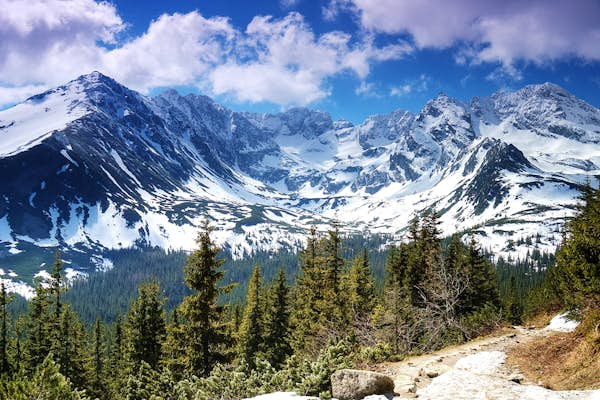Poland’s southern border is defined by the upward thrust of the Carpathian Mountains. Europe’s second-biggest mountain range after the Alps, the Carpathians sweep over central Europe in an arc from the Czech Republic in the west to Ukraine and Romania in the east.
In Poland, they form the boundary with Slovakia and provide a welcome contrast to the mostly flat landscapes characteristic of the rest of the country.
The mountains are also home to a unique highlander culture with its own folk history and traditions and, with good access from major cities such as Kraków and Rzeszów, it’s easy to combine a tour of the country’s historic towns and castles with a few days in the open air to hike, ski or raft.

Poland’s Carpathians are divided into a series of smaller ranges (running west to east): the Tatry, Beskids, Pieniny and Bieszczady. Each offers something a little different in terms of culture and natural beauty, and the town of Zakopane is the best jumping-off spot for exploring them. Here are five of our favourite high-altitude activities and the places to do them.
Hiking the mountain trails
It’s hard to find a better country for hiking than Poland. Trails criss-cross the land in all directions and are meticulously signposted in colours (red, blue, green and yellow) that correspond to hiking maps widely available in bookshops and tourist offices.

There are great hikes throughout the mountains, though the Tatry range, which rises just south of Zakopane, has the highest peaks (around 2500m) and offers the most dramatic vistas. The toughest trails scale the tops and carry on into Slovakia, but there are several easier, one-day adventures that start in Zakopane and follow the densely forested valleys that lead south out of town.
If you’re seeking solitude, make your way east to the remote Bieszczady range, near the border with Ukraine. From the town of Ustrzyki Górne, you’ll find several routes of varying lengths. One popular loop of around three hours begins to the south in the village of Wołosate, where a blue path runs to region’s highest peak at Tarnica (1346m). A red trail then doubles back to Ustrzyki Górne.
Skiing the pistes of the Tatry range
Zakopane, in the Tatry range, is Poland’s most popular winter resort, and there are a dozen or so ski areas nearby with slopes suitable for everyone from beginners to advanced.

Some of the most challenging pistes are at Mt Kasprowy Wierch (1985m), where decent conditions can last well into spring in some years. A cable car ascends the peak in 20 minutes; from here, stay in the mountains and use chairlifts to access the Goryczkowa and Gąsienicowa valleys. The view from the top is spectacular.
Mt Gubałówka is another popular nearby skiing area. It’s easily accessible from central Zakopane by funicular, covering the 1298m-long route in a few minutes and climbing 300m from the lower station just north of the centre of town.
Rafting along the Dunajec river
The tiny Pieniny range is home to one of the most fun and strikingly beautiful river rides in all of central Europe, along the Dunajec, which wends its way for some 18km near the town of Szczawnica.

Passengers are ferried in traditional boats guided by raftsmen decked out in embroidered folk costumes. It’s a slow float but the setting – through narrow gorges fronted by cliffs that rise 300m from the river – provides sufficient drama. The journey begins in the village of Sromowce Wyżne-Kąty.
For more conventional boating and sailing, there are two large bodies of water. Lake Solina, about 30km southwest of Ustrzyki Dolne in the Bieszczady range, is a man-made reservoir some 27km long and 60m deep. Polańczyk, an attractive town on the lake’s western shore, offers visitors everything from sailing and windsurfing to fishing and beaches. Lake Czorsztyn, in the Pieniny range, near the town of Szczawnica, is popular for sailing, and has the added benefit of a romantic ruined 13th-century castle on its shoreline.

Reviving the senses at a mountain spa
One of the biggest surprises of Poland’s mountains is the presence of pretty spa towns high in the hills. The combination of mineral springs in the area and fresh mountain air led to a boom in high-society health resorts in the 19th and early-20th centuries.
The monied leisure classes who once summered here are long gone, but they left behind some glorious timbered villas and the tradition of ‘taking the waters’ – strolling the promenade while sipping sulphur-flavoured mineral water with alleged curative benefits – that endures to this day. Two of the best spa resorts are Krynica in the Beskids and Szczawnica in the Pieniny.
Hunting down rustic architecture
The architectural highlight of any trip to the region is spotting the many historic wooden churches that dot villages throughout southern Poland. The most lucrative hunting ground for finding these timbered beauties from the 18th and 19th centuries is in the Beskids, along the back roads between Nowy Sącz and Krynica. Look particularly for churches in the villages of Berest, Polany, Tylicz and Muszynka.

The Museum of Folk Architecture in the town of Sanok in the Bieszczady range is Poland’s biggest open-air museum of traditional architecture, with its emphasis on simple rustic cottages and, naturally, wooden churches. The grounds of the museum are helpfully organised according to region and ethnicity, allowing visitors to see the subtle distinctions in building styles among the various mountain peoples.
Making it happen
While a few trains a day run Zakopane’s small train station from Kraków (pkp.pl; 25zł, 3½ hours), travelling by bus is faster and there are more frequent services; Szwagropol (szwagropol.pl) operates hourly bus services from Kraków (16zł, 1¾ hours).
